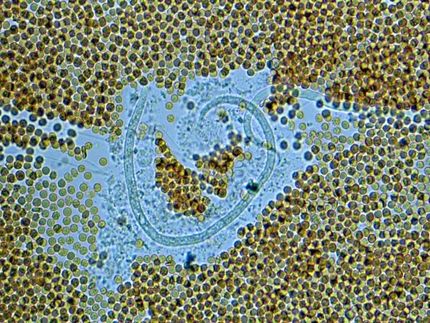The virulence of the Toxoplasma parasite identified
Advertisement
A research group led by Antonio Barragan of the Swedish Institute for Infectious Disease Control (SMI) and Karolinska Institutet (KI) has identified, with the help of colleagues from Washington University, the gene in the Toxoplasma parasite that accounts for its ability to cause disease. What the scientists have located is the kinase that seems to be the main virulence factor.
Between 14 and 25 per cent of the population of Sweden, and between 25 and 50 per cent of the global population, are bearers of a chronic, dormant infection from the Toxoplasma parasite. This makes the parasite possibly the most common in the world. It exists in our natural environment and is transferred into people through food, dirty water or contact with cats.
A healthy person who becomes infected with the parasite can develop influenza-like symptoms; it can then become dormant, making these people life-long carriers. However, for a person with weakened immune defence, such as someone with HIV/AIDS, an organ recipient or a cancer patient, the infection can prove life-threatening.
The scientists have found that parasites that exist in the environment or in chronically infected individuals carry either a "benign" (non-virulent) or a malignant (virulent) variant of the identified gene. The studies carried out in the SMI´s laboratories show that when the virulent variant of the gene is transferred to a benign parasite it leads to a 100 per cent lethal infection in mice; in other words, the formerly benign parasite becomes highly virulent.
The group believes that their findings will be of decisive importance for vaccine development and the diagnosis and treatment of serious Toxoplasma infection.
Original publication: S. Taylor, A. Barragan, C. Su, B. Fux, S. J. Fentress, K. Tang, W. L. Beatty, H. El Hajj, M. Jerome, M. S. Behnke, M. White, J. C. Wootton, L. D. Sibley; "A Secreted Serine Threonine; Kinase Determines Virulence in the Eukaryotic Pathogen Toxoplasma gondii"; Science 2006 Vol. 314.
Topics
Organizations
Other news from the department science
These products might interest you

Systec H-Series by Systec
Safe, reproducible and validatable sterilization of liquids, solids and waste
Autoclaves with 65-1580 liters usable space, flexibly expandable for various applications

Whatman™ folded filter papers by Cytiva
Whatman folded filter papers
Convenient folded formats speed up your sample preparation

Get the life science industry in your inbox
By submitting this form you agree that LUMITOS AG will send you the newsletter(s) selected above by email. Your data will not be passed on to third parties. Your data will be stored and processed in accordance with our data protection regulations. LUMITOS may contact you by email for the purpose of advertising or market and opinion surveys. You can revoke your consent at any time without giving reasons to LUMITOS AG, Ernst-Augustin-Str. 2, 12489 Berlin, Germany or by e-mail at revoke@lumitos.com with effect for the future. In addition, each email contains a link to unsubscribe from the corresponding newsletter.


























































